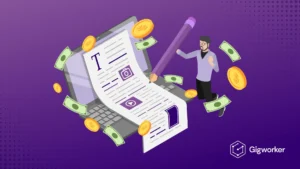If you’re wondering what the difference between being a freelancer and a self-employed individual is, you’ve come to the right place.
Although the two terms are often used interchangeably and are considered the same for tax reasons, here are a few things you should know about freelance vs self-employed.
The Differences and Similarities Between Freelance and Self-Employment
Freelancers are essentially self-employed people, but the opposite isn’t true — the terms aren’t synonymous.
A self-employed person likely won’t describe their work as freelance, as it’s similar to a traditional business, and they might even have employees, partners, and independent contractors. They’re more likely to brand themselves as entrepreneurs instead.
A freelancer is someone who works independently with a variety of clients and companies, often on a per-project basis.
One of the key differences is that freelancers must closely follow clients’ guidelines and requirements, whereas self-employed individuals typically set rules and services for themselves.
Another way to describe it is that freelancers seek clients, whereas clients come to self-employed people on their own.
Let’s break down a few noteworthy aspects to get a better idea of what being freelance vs. self-employed entails.
Legal Considerations
In the eyes of the IRS, freelancers are considered self-employed individuals. This means that the tax implications between the two are identical.
Both have to file 1099-K forms and may need to make quarterly tax payments on the 15th of April, June, September, and January of the following year.
Both must also pay the total FICA taxes, which amount to 15.3% of your taxable income. Normally, your employer pays half of the FICA taxes, but since you’re self-employed, both parts fall onto you.
Taxes start once you cross the $400 threshold, but there’s also a silver lining here — you’ll be eligible for tax returns and tax deductions based on business expenses.
Since you won’t be provided the equipment needed for work by your employer, you can buy it and write off the taxes. Even your computer is eligible for tax write-offs.
Work-Life Balance
The great thing about self-employment is that it allows you to create a healthy work-life balance.
Do you run a brick-and-mortar store, real estate agency, or work as a handyman?
You can figure out a schedule that works for you and share it with your clientele, since you’re your own boss. If you feel particularly energized, you can accommodate more work on that day and make more cash.
Freelancers can also figure out a schedule that works for them and stick to it. But the rules are laxer here. You can work 12-hour days, start in the morning and finish in the evening, and everything in between.
However, you may not be able to do this for some types of work — for instance, tutors have to stretch their schedule during exam season to whatever time fits their clients or risk losing them to someone else.
Another thing to note is that you can be a freelancer and also have a traditional full-time job.
Freelance work is typically done from home, so you can easily pick up tasks when you come back from your day job. You can also work on weekends and earn a couple hundred extra bucks.
A self-employed person doesn’t usually do multiple jobs, as they consider running their own business a full-time role that takes up all their energy and time.
Client Relationships
Both a self-employed individual and a freelancer have to build up trust with clients to retain them and stay in business.
But a significant difference is that self-employed workers typically focus on the local community — think about lawyers, real estate agents, and handymen.
They typically connect in person, which allows them to build trust more easily and get more referrals.
Meanwhile, the term “freelancer” is often applied to individuals who work as independent contractors for companies or individual clients, often from home. Whatever the case, they have a much broader reach.
However, connecting with clients remotely and getting referrals demands more effort. Freelancers rely on written and video testimonials run on their websites or business social media platforms like LinkedIn.
Income Stability
One similarity between the two is that they have somewhat inconsistent income. Self-employed business owners need a steady stream of customers to keep their businesses afloat and pay salaries.
Speaking of, some self-employed individuals choose to pay themselves a fixed salary rather than taking all of the money home. They can reinvest the rest and keep it for off-season months.
Freelancers instead get paid by the amount agreed upon with the client. It can be an hourly rate, per milestone, or per project. The wage frequency is flexible too.
Also, if you, as a freelancer, only work with individual clients rather than businesses, you’ll always have to be on the lookout for more clients and work.
Marketing, Branding, and Networking
Self-employed individuals market through localized ads, referrals, social media profiles, and events related to their jobs.
They also want to create a brand their customers will engage with — think of aesthetic posters plastered around the establishment, funny billboard ads, and memorable slogans.
The priority is always the local area, as they can’t really do much about someone across the country who’s interested in their services.
Freelancers can also leverage social media to network with potential clients and colleagues. They focus on building a personal brand rather than creating a business brand.
They can achieve success by being active on niche-related platforms, building a website with SEO content, email marketing, and collaboration.
Benefits (Health Insurance, Paid Vacations, and Retirement Plans)
When it comes to benefits, there are some similarities and a few stark differences between self-employed individuals and freelancers.
Similarities include that they both have to figure out health insurance and retirement plans for themselves.
Since they’re legally considered the same, both can sign up for solo 401(k)s and SEP IRA retirement plans and make active contributions.
If the self-employed person has employees other than themselves, they may have to contribute to employees’ plans, too.
Freelancers might get matching 401(k) plans if they work for a company and meet their requirements.
The same applies to health insurance, though self-employed individuals with employees may be eligible for SHOP coverage.
Maternity leave, paid time off, and sick days are all benefits associated with full-time employment.
This means that a self-employed individual can provide all these benefits for themselves, though they won’t be making any money during the time if they don’t have employees.
Unfortunately, freelancers generally don’t get to enjoy any of these benefits.
How To Decide Which Is Better: Freelance vs. Self-Employed
Now that you have a solid understanding of the differences, let’s see which type works best for you.
Freelance
Start freelancing if you’re a student, have a full-time job, or just want to do something on the side to hone your skills. Freelancers enjoy more freedom and flexibility than self-employed professionals.
Regardless of the type of work you’re in, your main job will be to ensure your client is happy by sufficiently communicating with them, understanding what they expect from you, and delivering the project on time.
Examples of Freelancers
- Content and Copywriters
- Graphic designers
- Web developers
- Tutors
Pros of Being a Freelancer
- Freedom: Pick the clients and companies you work for, as well as the projects you wish to work on, even if it’s multiple projects at once.
- Flexibility: Create whatever schedule works for you, and you can even work alongside a full-time job.
- Set your own rate: By setting your rates, you’ll never walk away unsatisfied with the money you made on a project.
- Never gets boring: You’ll work with multiple clients with different needs and projects.
Cons of Being a Freelancer
- Inconsistent income: Work isn’t always easy to come by as a freelancer, especially if you don’t work as an independent contractor for a company.
- No employment protection: You’ll have to rely on contracts and written terms to avoid getting scammed, which is exacerbated if you work with international clients.
- Isolation: You’ll spend long hours alone in front of your computer. And even if you get to work with others on a project, you’ll still do most of your work independently.
Self-Employed
Do you value stability but don’t want a boss breathing down your neck? Becoming a self-employed worker is the way to go.
You’ll get to enjoy many of the same benefits as a freelancer while also operating more like a traditional business owner. You could even hire employees once you have enough work to go around.
Examples of Self-Employed Individuals
- Lawyers
- Actors
- Doctors
- Accountants
Pros of Being Self-Employed
- Complete control: You make the rules of your business, and you have complete executive control over strategies, ideas, and other significant decisions.
- High earning potential: If you’re an expert doctor or lawyer, you can earn significantly more money as a solo practitioner than working for someone else or through random freelance work.
- Building a lasting business: If you make a name for yourself in the industry, you can hire employees, delegate work, and leave a legacy for your family.
Cons of Being Self-Employed
- More rigid schedule: While you have more control and flexibility over your time management, operating within business hours typical for your industry is advantageous.
- Diverse responsibilities: You’ll have to take care of setting terms, legal compliance, marketing, and financial responsibilities like health and business insurance.
- Risk: Running a business is inherently more risky than being a small-time freelancer who works with clients to make a quick buck.
Wrapping Up
Although freelancers are legally considered self-employed individuals, there are a few differences in how we use the two terms.
Freelancers typically work with individual clients or at companies as contractors and often do their work from home.
Meanwhile, self-employed individuals are more akin to traditional businesses and can have employees. They usually limit their work to the local area and establish themselves as the best experts in their field.
Do you consider yourself a freelancer or self-employed? Let us know in the comments below, and don’t forget to share this article with anyone who might find the difference in concepts interesting.








